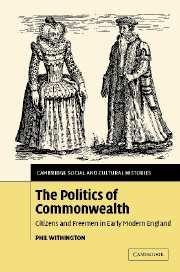Book contents
- Frontmatter
- Contents
- List of figures
- List of tables
- Acknowledgements
- Part I Introductions
- Part II Cultural resources: ideology, place, company
- 3 Citizens and subjects
- 4 Placing the city commonwealth
- 5 Civic conversations
- Part III Honest distinctions: economy, patriarchy, religion
- Conclusion
- Bibliography
- Index
3 - Citizens and subjects
Published online by Cambridge University Press: 23 December 2009
- Frontmatter
- Contents
- List of figures
- List of tables
- Acknowledgements
- Part I Introductions
- Part II Cultural resources: ideology, place, company
- 3 Citizens and subjects
- 4 Placing the city commonwealth
- 5 Civic conversations
- Part III Honest distinctions: economy, patriarchy, religion
- Conclusion
- Bibliography
- Index
Summary
‘Natural subjects’
Historians have long taken to heart the assertion of the anonymous ‘apologist’ of Elizabethan London that it was ‘besides the purpose, to dispute, whether the estate of the government here be a Democracy, or Aristocracy’. Affixed by John Stow to the end of his Survey of London, the ‘Apology’ explained that in ‘respect of the whole Realm, London is but a citizen and no city, a subject and no free estate’. Like any other city, London was ‘no place endowed, with any distinct or absolute power’. Lacking sovereignty, it was ‘governed by the same law, that the Rest of the Realm is’; sent burgesses to Parliament ‘as every poor Borough does’; and, ‘in the persons of the Citizens’, it was ‘friendly interlaced, and knit in league with the rest of the realm’. As ‘merchants, handicrafts men and labourers’, citizens were ‘by birth … for the most part a mixture of all countries [counties]’. Moreover, at ‘their ending of life and conversation’ they more often than not returned whence they came. Far from being a distinct class or estate, citizens were ‘a part of the commons’, their city commonwealth ‘a member of the commonalty’: no matter their liberties and privileges, they remained ‘natural subjects’ like everyone else. For all its defensiveness, however, the apology begs as many questions as it answers. Why was it that politics in London should be described as democratic or aristocratic in the first place?
- Type
- Chapter
- Information
- The Politics of CommonwealthCitizens and Freemen in Early Modern England, pp. 51 - 84Publisher: Cambridge University PressPrint publication year: 2005



